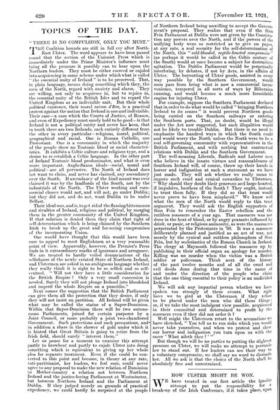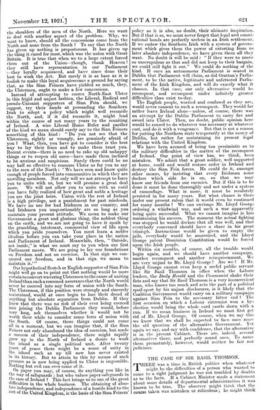HOW ULSTER MIGHT BE WON.
WE have treated in our first article the ignoble attempt to put the responsibility for a break-up of the Irish Conference, if it takes place, upon the shoulders of the men of the North. Here we want to deal with another aspect of the problem. Why, we want to know, should all the concessions come from the North and none from the South ? To say that the North has given up nothing is preposterous. It has given up the thing it cared for most, which was the union with Great Britain. It is true that when we to a large extent forced them out of the Union—though, thank Heaven ! they still have representation in our Parliament —they loyally acquiesced, and have since done their best to work the Act. But surely it is as base as it is foolish to make this loyal acquiescence a ground for saying that, as the Sinn Feiners have yielded so much, they, the Ulstermen, ought to make a few concessions. Instead of attempting to coerce North-East Ulster in this frigid and unjust fashion, the Liberal, Radical and pseudo-Unionist supporters of Sinn Fein should, we suggest, try their hands at persuading the Southern Irish to adopt a policy which might well reconcile the North, and, if it did reconcile it, might lead within the course of not many years to the reuniting of Ireland. A wise Liberal Home Ruler and pacifier of the kind we mean should surely say to the Sinn Feiners something of this kind : " Do you not see that the Ulstermen, rightly or wrongly, are genuinely afraid of you ? What, then, you have got to consider is the best way to lay their fears and to make them trust you. Recent events—there is no need to rake up old unhappy things or to reopen old sores—have made them inclined to be anxious and suspicious. Surely there could be no way half so effective to reassure Ulster as for you to say to the men of the North : We have seen and know quite enough of people forced into communities in which they are unwilling members. Not only will we not attempt to force you to unite with us, but we will promise a great deal more. We will not allow you to unite with us until you have fully realized of how great and noble a heritage you are the joint heirs. Union with the rest of Ireland is a high privilege, not a punishment for past misdeeds. We have no use for bad Irishmen in our country, and bad Irishmen you unquestionably are so long as you maintain your present attitude. We mean to make our Government a great and glorious thing, the noblest thing on the earth, and we tare not going to have it spoilt by the grumbling, intolerant, commercial view of life upon which you pride yourselves. You must learn a nobler idealism before you can take your place in the nation and Parliament of Ireland. Meanwhile, then, " Outside, not inside," is what we must say to you when our first Parliament meets. We are going to lay our foundations on Freedom and not on coercion. In that sign we con- quered our freedom, and in that sign we mean to maintain it.'" Our hypothetical Scotch or English supporter of Sinn Fein might well go on to point out that nothing would be more certain to convert wavering Ulstermen to the cause of uniting Ireland than such a reasoned assurance that the North would never be coerced into any form of union with the South. The Ulstermen, if this position were strongly and sincerely maintained, would at once begin to lose their dread of anything but absolute separation from Dublin. If they knew that there was no risk of their ever being coerced into joining the Dublin Parliament they would, before very long, ask themselves whether it would not be worth their while to consider some form of union with the South. Of course, these things could not come all in a moment, but we can imagine that, if the Sinn Feiners not only abandoned the idea of coercion, but made a success of their independence, there might rapidly grow up in the North of Ireland a desire to work the island as a single political unit. After twenty years of peace there might be a sense of unity in the island such as up till now has never existed in its history. But to attain to this by means of such pressure as is now being applied to Ulster is impossible. Nothing but evil can ever come of it. On paper you may, of course, do anything you like in the way of safeguards ; but who values paper-safeguards in the case of Ireland ? This fact brings us to one of the great ;lifficillties in the whole business. The obtaining of abso- lute independence, and independence of a hostile kind to the rest of the United Kingdom, is the basis of the Sinn Feiners' policy as it is also, no doubt, their ultimate inspiration. But if that is so, we must never forget that legal and consti- tutional bonds are perfectly useless in an Irish settlement. If we endow the Southern Irish with a system of govern- ment which gives them the power of extorting from us later absolute independence, we have given them all they want. No doubt it will be said : " If they were to prove so unscrupulous as that and did not keep to their bargain, we could still fight it out." We could do nothing of the kind. If once an autonomous Parliament is seated in Dublin that Parliament will claim, as did Grattan's Parlia- ment, to be the native, legitimate and unfettered Parlia- ment of the Irish Kingdom, and will do exactly what it chooses. In that case, our only alternative would be reconquest, and reconquest under infinitely greater difficulties than exist to-day. The English people, worried and confused as they are, would never consent to such a reconquest. They would far rather leave Ireland alone—unless, of course, there was an attempt by the Dublin Parliament to carry fire and sword into Ulster. Then, no doubt, public opinion here would be roused to do whatever was necessary at whatever cost, and do it with a vengeance. But that is not a reason for putting the Northern state temporarily at the mercy of Dublin, but rather for maintaining its present legal relations with the United Kingdom.
We have been accused of being too pessimistic as to the military difficulties in the matter of the reconquest of Ireland. Our point of view has, we think, been mistaken. We admit that a great soldier, well supported at home, could and would restore order in Ireland and destroy the Sinn Fein forces. He could do it, amongst other means, by insisting that every Irishman must declare which side he is on, so that we may know our friends from our enemies. But if this is to be done it must be done thoroughly and not under a system of camouflage. What is more, it must be resolutely persisted in for many years. But what chance is there under our present rulers that it would even be continued for many months ? We can envisage Mr. Lloyd George ordering a whirlwind war, and such a war apparently being quite successful. What we cannot imagine is him maintaining his success. The moment the actual fighting was stopped he would declare that all was well, and that everybody concerned should have a share in his great triumph. Instructions would be given to empty the jails, everybody would be amnestied, and the Lloyd George patent Dominion Constitution would be forced upon the Irish people. Within six months, of course, all the trouble would begin again, and we should have another campaign, another reconquest and another reimprisonment. We are very unjust to Mr. Lloyd George I Are we ? If Mr. Lloyd George cannot even keep a useful public servant like Sir Basil Thomson in office when the Labour leaders, the Daily Herald and the Communist shake their fists and say that Sir Basil Thomson is a very inconvenient man, who knows too much and acts the part of a political spoil-sport by his unjust disclosures, is it likely that the Coalition Government would carry on a military campaign against Sinn Fein to the necessary bitter end ? The first occasion on which a Labour extremist won a by- election would bring the whole card castle down with a run. If we mean business in Ireland we must first get rid of Mr. Lloyd George. Of course, when we say this we know that we shall be expected to face once more the old question of the alternative Government. Yet again we say, and say with confidence, that the alternative is in the present Cabinet. There are, indeed, several alternatives there, and perfectly sound ones. To name them prematurely, however, would neither be fair nor judicious.







































 Previous page
Previous page